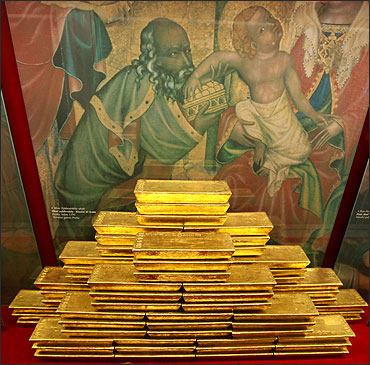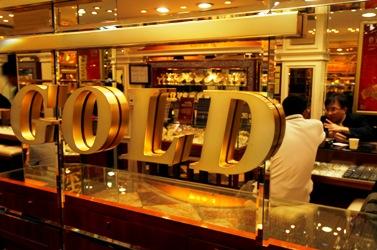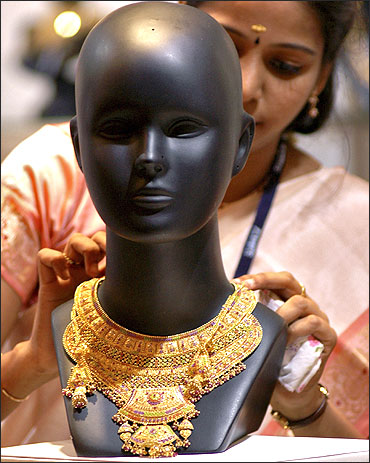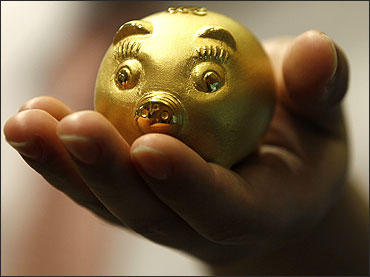 | « Back to article | Print this article |
Get ready for the next bull run in GOLD
"I wanted to ask you something," said my roommate late in the evening after we had just had a sumptuous Chinese meal.
"Not now. Let me just listen to the rain," I replied.
"You have been listening to the rain for the last three days now."
"Have I?"
"Yes, m'am," she sneered.
"Okay, so what do you want to ask?"
"Where do you see the price of gold going in the days to come."
"On a very broad level, the price will keep moving up," I replied.
"Broad level?"
"The prices of any commodity do not move in a straight line. What I mean by broad level is that the prices will keep moving up, but in between they may fall as well. . . but they will go up again."
"But what makes you so confident?"
Click NEXT to read on . . .
Get ready for the next bull run in GOLD
"Well, I was just reading through some material and I realised that there is another solid reason for gold prices to go up," I told her.
"Other than all the money printing that is happening and is likely to happen in the days to come, all around the world?" she asked.
"Yes."
"So what is this new reason?" she asked.
"Ever heard of Hugo Chavez?"
"Nope. Who's he?
"He is the President of Venezuela."
"Venezuela?"
"A country in South America."
"I know that. But what's that got to do with the price of gold?" she asked.
"You see, Venezuela has the 15th largest gold reserves in the world amounting to 401.1 tonnes," I informed her.
"So?"
"A lot of this gold is lying abroad in banks in New York, London and Zurich."
"But why will a country keep its gold overseas?" she interrupted.
Click NEXT to read on . . .
Get ready for the next bull run in GOLD
"A part of the reason comes from history. Till August 15, 1971, the world was on a gold standard. Paper currencies were ultimately convertible into gold. This meant that countries had to settle their deficits in gold."
"What are you talking about?"
"Let's say England and France are exporting and importing stuff from each other. At the end if France exports more to England than England to France, there is a deficit."
"And. . .?"
"This means that England had to pay France. This payment was to be made in gold."
"Oh, I see."
"Now this meant that gold had to be physically moved from England to France, which of course was a pain. Movement meant cost of insurance as well as security."
"So what was the way out?"
"A lot of this gold was simply stored overseas at the Federal Reserve Bank of New York (a part of the Federal Reserve of the United States, the Central Bank of the US)."
"And how did that help?"
Click NEXT to read on . . .
Get ready for the next bull run in GOLD
"As Peter Bernstein writes in The Power of Gold, 'For example, if England lost gold to France, a guard at the Federal Reserve had merely to bring a dolly to England's closet, trundle the gold to the French closet, and note the change in the bookkeeping records.'
"I guess, that explains it."
"So let's get back to Hugo Chavez," I said.
"Okay."
"Estimates suggest that nearly 211 tonnes of the 400-odd tonnes of gold that Venezuela has are with banks abroad. Chavez has asked this gold to repatriated back to Venezuela."
"Oh. But why would he do that?"
"Chavez has had an anti-US stance for years and may feel that because of that Venezuela runs the risk of its gold being seized."
"Seized? Is that a possibility?"
"It sure is. Libya's foreign exchange reserves were seized after war broke out there earlier this year."
"But what has all this got to do with the price of gold? To me it's as simple as me wanting to have gold in my own locker rather than the bank locker."
"Fair point. But there is a link."
Click NEXT to read on . . .
Get ready for the next bull run in GOLD
"Please explain."
"See out of the 211 tonnes lying abroad, 99 tonnes are with the Bank of England in London. Repatriating that back to Venezuela would be a straightforward process."
"So?"
"Well, a lot of the gold lying abroad is with what are known as bullion banks. J P Morgan is one of them. Estimates suggest that Venezuelan gold worth $807 million (or around 450,000 ounces of gold) is lying with it."
"So what? Even that would be a straightforward transaction? Wouldn't it?"
"Not really. Estimates suggest that the total amount of physical gold with J P Morgan currently stands at around 338,303 ounces (1 troy ounce equals 31.1 grams)."
"Where did the remaining gold go?" she asked.
Click NEXT to read on . . .
Get ready for the next bull run in GOLD
"Central banks around the world had a huge amount of gold lying in their vaults, not earning any return. By the end of 2007, central banks around the world had 32,000 tonnes of gold."
"What are you driving at?" she interrupted.
"Just hold on. Out of the 32,000 tonnes they had, they lent out 14,000 tonnes to bullion banks like J P Morgan. As James Turk and John Rubino explain in The Collapse of the Dollar, 'Lending, for instance, involves the central bank transferring gold to a major private bank, known as bullion bank, which pays the central bank a small-but-positive interest rate, then sells the gold on the open market'," I quoted.
"How did that help?"
"Central banks could convert the gold into cash and then deploy it somewhere to earn some return."
"Makes sense."
"The operative word here is lending. The gold has been lent, and so central banks can demand it back."
"And which is what Venezuela is doing right now," she pointed out.
Click NEXT to read on . . .
Get ready for the next bull run in GOLD
"Yes, it is. As the authors write, 'Because the bullion banks have promised to eventually return the borrowed gold to the central banks, they are, in effect, 'short' gold. That is, at some point in the future they are obligated to buy gold in order to repay the central banks'."
"So which effectively means that the likes of J P Morgan will now have to buy back gold in order to repay the Venezuelan government given that Venezuela has around 450,000 ounces of gold with J P Morgan, whereas J P Morgan has only 338,303 ounces on its books," she said, getting the gist of the issue.
"Right! And this buying will lead to the price of gold rising further. But that's just one part of it. As a recent report titled Thing That Make You Go Hmmm points out, 'Chavez's move could set in motion a chain of events whereby Central banks who store the bulk of their gold overseas in 'safe' locations scramble to repossess their country's true 'wealth'. If that happens, the most high-stakes game of musical chairs the world has ever seen will have begun'," I said.
"That sounds very scary."
"Yes, it does. The report further points out, 'Any delay in repatriating Venezuela's gold could potentially start a frantic scramble by central banks to claim their physical gold and, if that happens, you can be assured that a fire will be lit under the gold price the likes of which we haven't yet seen."
"So gold is ready to kick some serious ass in the days to come," she said.
"Yes, it is," I replied.
The author can be reached at shonalee.biswas@rediffmail.com






